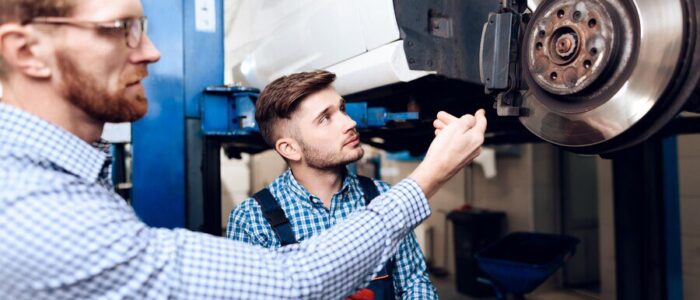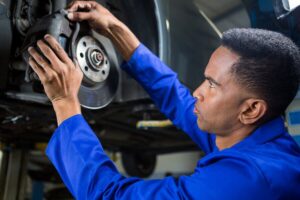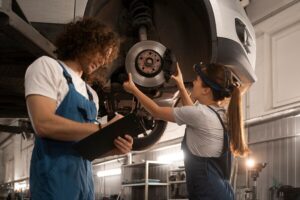
Maximizing your car’s lifespan entails diligent adherence to routine brake shop maintenance. Neglecting your vehicle’s braking system can lead to dire consequences, compromising not only your safety but also the longevity of your automobile. Regular brake inspections and maintenance checks are essential to ensure optimal performance and longevity of your vehicle. By scheduling routine visits to the brake shop, you can identify potential issues early on, such as worn brake pads or leaking brake fluid, mitigating the risk of more significant and costly repairs down the road. Moreover, timely maintenance can preserve the integrity of critical components, such as rotors and calipers, prolonging their lifespan and enhancing overall braking efficiency. Investing in routine brake shop maintenance is not just about preserving your car’s performance; it’s about safeguarding your well-being and that of others on the road while maximizing the longevity of your cherished vehicle.
Importance of Regular Brake Inspections
Regular brake inspections are crucial for ensuring the safety and performance of your vehicle. By having your brakes inspected at recommended intervals, potential issues can be identified early, preventing more significant problems down the road. Brake inspections involve checking various components such as brake pads, rotors, calipers, and brake fluid levels. Addressing any issues promptly not only enhances safety but also extends the lifespan of your braking system, saving you money in the long run. Additionally, well-maintained brakes contribute to smoother driving experiences and reduce the risk of accidents.
Signs Your Brakes Need Attention
Recognizing signs that indicate your brakes need attention is essential for maintaining your vehicle’s safety and performance. Common signs include squealing or grinding noises when braking, a soft or spongy brake pedal, vibrations or pulsations while braking, and longer stopping distances. Ignoring these signs can lead to further damage to your brake system, compromising your safety on the road. Therefore, if you notice any of these symptoms, it’s important to have your brakes inspected and serviced promptly by a qualified mechanic.
Benefits of Timely Brake Fluid Checks
Regularly checking and replacing brake fluid is vital for maintaining the effectiveness of your braking system. Over time, brake fluid can become contaminated with moisture and debris, which can lead to corrosion and reduced braking performance. Timely brake fluid checks help ensure that your brakes operate smoothly and efficiently, providing consistent stopping power when needed. Additionally, fresh brake fluid helps prevent corrosion within the brake lines and components, extending their lifespan. By incorporating brake fluid checks into your routine maintenance schedule, you can enhance the safety and longevity of your vehicle’s braking system.
Extending Brake Pad and Rotor Life
Proper maintenance practices can significantly extend the lifespan of your brake pads and rotors, saving you money on replacements. One key strategy is to avoid aggressive driving habits that can accelerate wear and tear on these components. Additionally, keeping your brakes properly adjusted and ensuring that your wheels are properly aligned can help distribute braking forces more evenly, reducing uneven wear. Regularly cleaning and lubricating brake components can also prevent premature deterioration. Furthermore, using high-quality brake pads and rotors and following manufacturer recommendations for replacement intervals can help maximize their longevity. By taking these proactive steps, you can optimize the performance and durability of your braking system.
The Role of Proper Brake Caliper Maintenance
Brake calipers play a critical role in the functionality of your braking system, as they are responsible for applying pressure to the brake pads, which then press against the rotors to slow or stop the vehicle. Proper brake caliper maintenance is essential for ensuring smooth and consistent braking performance. This includes regular inspection for signs of damage or wear, such as leaking brake fluid, stuck pistons, or uneven brake pad wear. Additionally, cleaning and lubricating the caliper slides and pins help ensure that the calipers can move freely and apply pressure evenly to the brake pads. By maintaining your brake calipers properly, you can enhance the safety and longevity of your vehicle’s braking system, providing peace of mind on the road.
Preventing Costly Brake System Repairs
Regular maintenance is key to preventing expensive brake system repairs. By implementing proactive measures, you can avoid major issues and keep your vehicle running smoothly.
- Conduct Regular Inspections: Regularly inspect your brake system for signs of wear and tear, such as worn brake pads, leaking brake fluid, or unusual noises when braking.
- Address Issues Promptly: If you notice any abnormalities with your brakes, address them promptly to prevent minor problems from escalating into costly repairs.
- Use High-Quality Parts: Invest in high-quality brake components to ensure durability and reliability, reducing the risk of premature wear and tear.
- Avoid Aggressive Driving: Aggressive driving habits, such as excessive speeding or harsh braking, can put unnecessary strain on your brakes and lead to premature failure.
- Follow Manufacturer Recommendations: Adhere to the manufacturer’s recommended maintenance schedule and replacement intervals for brake components to prolong their lifespan and prevent costly repairs.
By prioritizing regular maintenance and adopting safe driving practices, you can minimize the risk of costly brake system repairs and enjoy peace of mind on the road.
Creating a Personalized Brake Maintenance Schedule:
Developing a personalized brake maintenance schedule tailored to your driving habits and vehicle’s needs is essential for optimal performance and safety. By following a structured maintenance plan, you can ensure that your brakes receive the attention they require to function effectively.
- Consider Driving Conditions: Take into account the driving conditions you typically encounter, such as city driving, highway commuting, or off-road adventures, when determining your maintenance schedule.
- Monitor Brake Pad Wear: Keep track of your brake pad wear and replace them as needed to maintain optimal braking performance and prevent damage to other brake components.
- Schedule Regular Inspections: Schedule routine inspections with a qualified mechanic to assess the condition of your brake system and address any issues before they escalate.
- Factor in Mileage: Use your vehicle’s mileage as a guideline for scheduling maintenance tasks, such as brake fluid changes, rotor inspections, and caliper lubrication.
- Customize Based on Usage: Customize your maintenance schedule based on your vehicle’s usage patterns, such as towing heavy loads or frequent stop-and-go driving, to ensure that your brakes can handle the demands placed on them.
By creating a personalized brake maintenance schedule and staying proactive about upkeep, you can prolong the lifespan of your braking system and maintain optimal safety and performance levels.
Conclusion
Prioritizing routine brake maintenance is pivotal for maximizing the lifespan of your vehicle. Last Chance Auto Repair For Cars Trucks stands as a beacon of reliability and expertise in this endeavor. By regularly servicing your brakes at Last Chance, you ensure optimal performance and safety on the road. Neglecting brake maintenance can lead to costly repairs and compromise the longevity of your car or truck. With Last Chance’s skilled technicians and dedication to quality service, you can trust that your vehicle’s braking system is in capable hands. By investing in routine maintenance, you not only extend the lifespan of your vehicle but also safeguard yourself and others on the road. Don’t wait until it’s too late—visit Last Chance Auto Repair For Cars Trucks and keep your vehicle running smoothly for miles to come.


